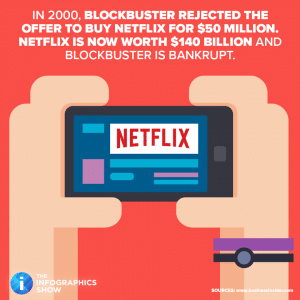What is innovation?

- The first, you must innovate or face extinction and the second;
- Innovators have dilemmas.
In this age of disruptive technology and globally integrated markets, an innovation strategy is key to success. Some companies even define their raison d’être as being at the forefront of innovation, but what does innovation actually mean?
Innovation is many things. It is an essential evolutionary mechanism that allows species, and—for our purposes—businesses, to survive the changes in their environment and/or prosper in a new environment. It can happen purposefully or accidentally. It can be radical or subtle. It happens in some companies and some countries with much greater frequency than others.
The history of business is littered with examples of companies that failed to innovate and died as a consequence of that failure, and also those bold firms who innovated their way to global relevance seemingly overnight.
There are four major types of innovation:
1. Incremental innovation is by far the most common type of innovation. It is the process of implementing an existing technology within an existing marketplace to add value and deliver a better product or service more efficiently. The continual incremental improvements to user interfaces in software products are examples of incremental innovation.
2. Architectural innovation is the process of taking your existing skills, technologies and lessons learned and creating value by applying them to a new market. For example, NASA-developed viscoelastic polyurethane foam is now commonly used to build mail-order memory foam mattresses, and consequently a booming industry.

4. Disruptive innovation is perhaps the most misunderstood of the four. It is the application of new technology to an existing marketplace. That technology is initially more expensive and addresses an underserved market, as such, the products or platforms using the new technology are considered niche. But as maturity and economies improve, the technology eventually becomes compelling to mass audiences and renders incumbent companies uncompetitive. Blockbuster video’s fall to Netflix is an example of disruptive innovation. We call disruptive innovators “blindside attackers” because you usually don’t realize your business is threatened until it is much too late.
What is an innovation strategy?
An innovation strategy is a plan to improve profitable revenue or market share through service or product innovation. Innovation strategies most often involve the application of technology. They are conceived through deep analysis of customer needs and “jobs-to-be-done” (filling a gap) or through the nurturing of certain kinds of company culture and/or leadership style. Innovation strategies define how much and what kind of resources need to be assembled and how they will be deployed, and can even be used as a means of creating an early warning system of disruptive innovator threats and preparing responses to potential competitive threats.
Why does innovation strategy matter?
The traditional approach to a company’s strategy has been the application of operational excellence. This makes perfect sense—if we can service our customers more efficiently then our products will be more competitive, and we will be rewarded with greater market share and repeat business, improving the returns to our investors. The challenge is that the predominance of this lens can leave a company vulnerable to missed opportunities and competition from companies that are not playing by the same rulebook.
Almost all established companies should leverage their core competencies and work to more efficiently address their existing customer’s needs. Succeeding in this is what keeps the lights on and your employees showing up to work each day. However, in this age of increased change and technological advancement, it is becoming more and more difficult to stay in business, let alone succeed at a rate better than average. If you don’t have an innovation strategy, work diligently to foster a culture of innovation, develop distinctive measurements, and protect the budget and people allocation against the inevitable quarter to quarter pressures of delivering bottom-line results, your company is going to have problems.
Innovation strategy should be a core element of any company’s business strategy.
7 reasons every company needs an innovation strategy
- We live in an era of rapid change. Artificial intelligence, blockchain, IoT, 5G, 3D printing, intelligent automation, autonomous transportation, and low earth satellites all have the potential to redefine existing markets and create new ones. Charting a course to survive and prosper is fundamental to business success.
- The danger of blindside attacks is very real. Disruptive innovators are leveraging technology in entirely new ways the consequences of which can be hard to recognize until it is too late (as Netflix example above). You may spend way too many resources trying to protect your market share only to wake up one morning and discover that the rules have changed, and your market no longer exists.
Customers are more informed and more engaged. Customer behaviour is being shaped by technology and ready access to real-time information. Customers increasingly view innovative companies as better aligned with their needs.
- The rate and pace of change are accelerating. As the pace of technology-driven change and shifting customer expectations accelerate, companies will need to show up in the marketplace with new products that better address customer needs on an increasingly shorter timeline.
- Technology transfer friction has fallen. Advances in one field can now quickly jump to and impact another industry. For example, digital imaging put film manufacturers out of business and personalized medicine will redefine the pharmaceutical space.
- Skill acquisition and retention are much easier for innovative firms. Talented people want to work for firms that have a vision, are forward-thinking and do not tend towards complacency as a result of their success. They view working on something innovative as being meaningful, and get fulfillment from “inventing the future”.
- Brand value is accelerated by innovation. Customers and investors value innovative companies. Customers believe that their purchases are more future-proofed and that their value is magnified through innovative extensions, new versions, and the network effects caused by other like-minded customers. Investors value companies that don’t sit on their laurels and are leveraging technology and the rapid and scalable value magnification enabled by it.
By: Douglas Heintzman, Innovation Practice Lead at Burnie Group
Looking to transform your business?
CONNECT WITH US

